I couldn't be more thrilled at the very idea of such a movement by Brunei. She came back with a nicely packaged bag of rice, our "Laila" rice. After I got over my excitement, the first question I asked was, "How much is it?" It would have been a great idea for a gift with the neat packaging since I have been looking out for Brunei-made gifts lately.
Anyway, back to the photos. We are taking steps towards self-sufficiency, be it baby steps or giant steps as one wishes to critic, they are steps. And, I have always been proactive with any approach taken for the development of our country. So, yes, I am ecstatic. Sure, we can set off our defence of skepticism and as much as it is a bad year economically, we got several things started; the SPN 21, UBD's GenNext Programme, memos are circulating around our offices on training courses for professional development and now, growing our own rice to reduce imports.
So, here are a series of photos taken by JFL for the event.
Arriving at the padi fields

Guests gathering at the event venue
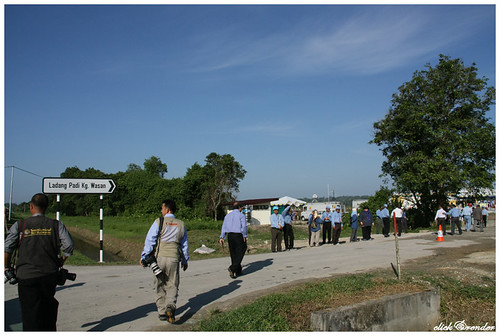
Guest seated in nice tents
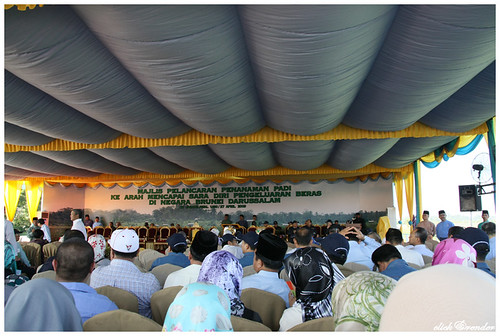
A man on the padi field
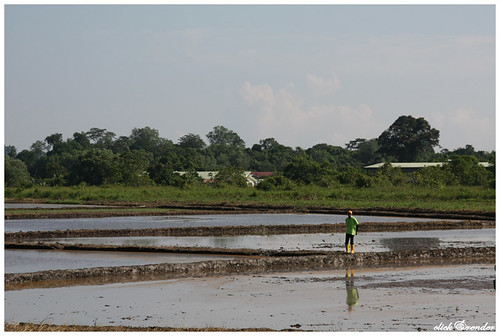
Camera crew getting ready for the arrival of the royal guests
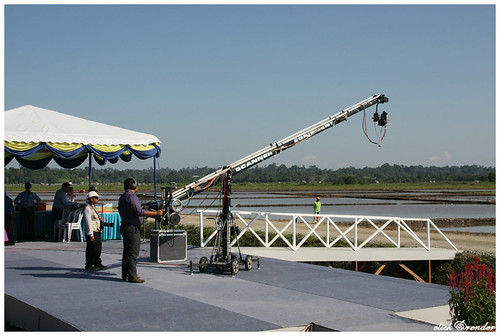
His Majesty, our Sultan

His Royal Highnesses Crown Prince Al-Muhtadee Bilah and his uncle, Prince Sufri

His Majesty on the transplanter
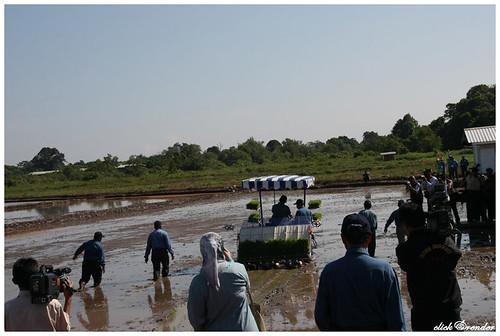
See the rows of freshly planted padi by the Sultan
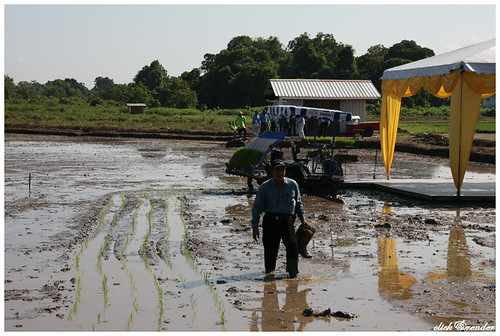
Guests marveling at the transplanter
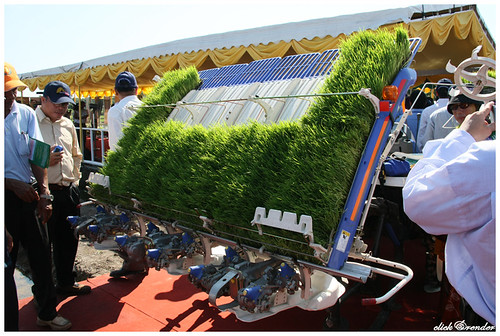
Posters of padi planting behind the plague which marks the official launch.
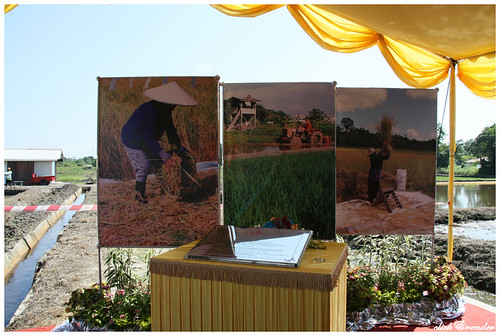
Getting to know more about padi planting programme in Brunei
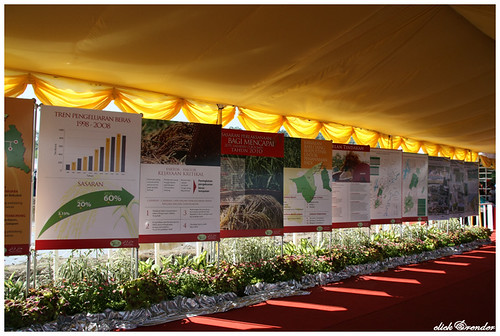

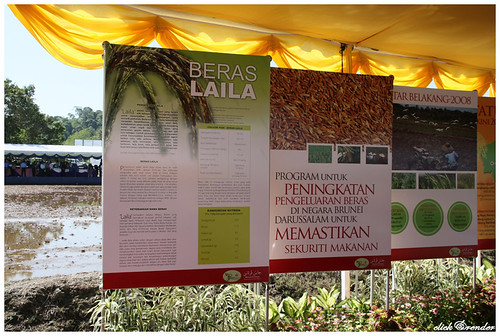
Having a close look at the transplanter
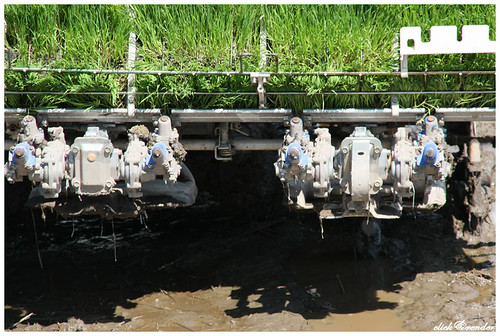

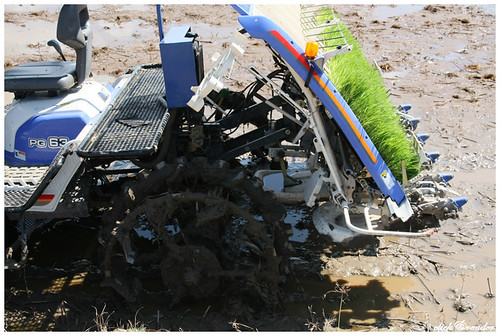
A bigger version
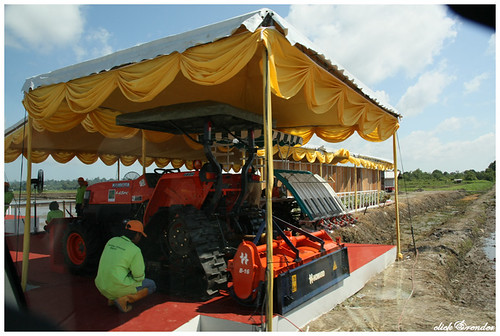
A big water pipeline that irrigates the fields
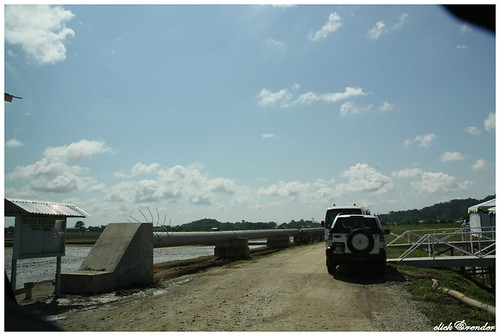
Irrigated padi fields

Fields just covered with seedlings

Beautiful Brunei countryside
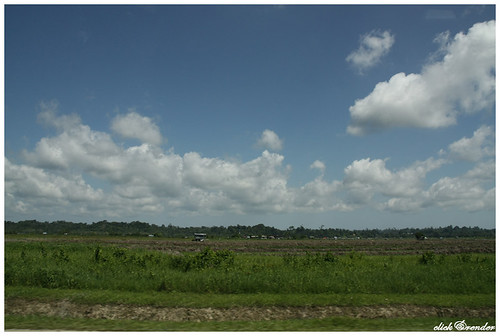
Wasan Vocational School buildings
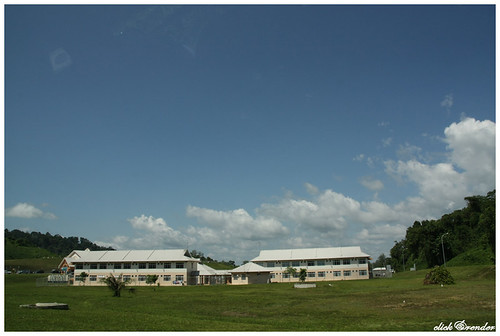

A luncheon in preparation


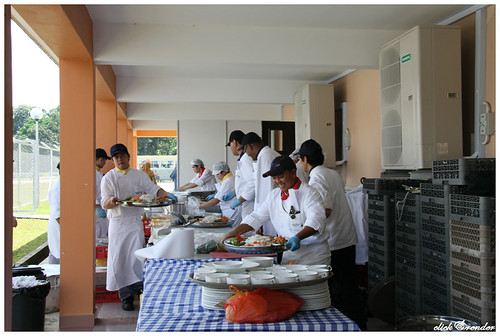
The newly launched "Laila" rice
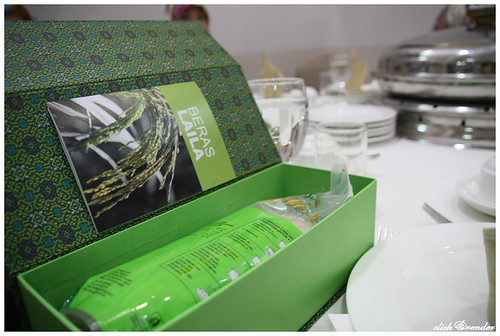

3 comments:
Local Rice Production Hit 895 MT Last Year
Tuesday, 05 August 2008
By Jon Tampoi
Bandar Seri Begawan - The Agriculture Department said yesterday local rice production shot up to 895 metric tonnes in 2006, or 2.88% of the national requirement, from 350 metric tonnes in 2001. It targets to achieve 10 per cent of the national needs.
To boost local rice production, it had reopened the Wasan Rice Project, which is expected to produce more than 150 metric tonnes of paddy this year, the department said in a press release.
The Wasan rice project includes 129 retired members of the Royal Brunei Armed Forces and 68 farmers of Mukim Pengkalan Batu. The rice project was reopened to the private sector's participation at the end of 2005. With the Agriculture Department's continuous support and training, 202.1 hectares have been planted during the main season in September 2006. Some of the plots harvested as early as February gave a good yield based on preliminary data.
Apart from damage caused by birds and lodging, the plantation is considered to be successful, the department said .
The Department of Agriculture has found Brunei Darussalam Rice One as having a high potential for development, after tests at different farming plots in the four districts.
It comes from the International Rice Research Institute line, 1R67406-6-3-2-3. The variety is high yielding (four to six tonnes per hectare), resistant to bogging as it is shorter (90 to 100 cm), fertiliser responsive, photo-period insensitive and short field duration (around 90 days) with 21 days seedling stage.
Hence, it can be grown two to three times a year under irrigated condition. The grain size is similar to the popular Basmati rice. The preliminary sensory test, based on taste, texture and scent, has shown positive results.
To date,, the popular grown varieties are Pusu, Adan and Bario but these are low yielding (1.5 to 2.5 tonnes / hectare), very tall (around two metres), lodge prone, slow growth (150 to 160 days) and photo-period sensitive hence, these are grown once a year.
IRRI lines were tested for yielding potential, eating quality, resistance to diseases and pest and agronomic characteristics in experimental plots at the Agriculture Research and development centre in Kilanas during the 2000 to 2002 seasons. -- Courtesy of Borneo Bulletin
'Laila Rice' to Brunei's rescue
Ubaidillah Masli, Goh De No and Faez Hani
BRUNEI-MUARA
Tuesday, April 28, 2009
HM leads drive towards achieving self-sufficiency in rice production
HIS Majesty the Sultan and Yang Di-Pertuan of Brunei Darussalam yesterday officiated the renaming of the Brunei Darussalam Rice 1, which will now be referred as "Laila Rice" during the launch of the "Padi Planting Towards Achieving Self-Sufficiency of Rice Production in Brunei Darussalam" ceremony at the Wasan padi fields.
His Majesty, bare-handed, planted several rice seedlings, a move which was regarded by many as further evidence of the monarch's dedication and seriousness in His Majesty's vision of achieving food security for the nation through self-sufficiency.
The benevolent ruler was joined in the field by His Royal Highness Prince Hj Al-Muhtadee Billah, the Crown Prince and Senior Minister at the Prime Minister's Office, His Royal Highness Prince Haji Sufri Bolkiah, His Royal Highness Prince Haji 'Abdul 'Azim and His Royal Highness Prince 'Abdul Malik.
The involvement of the monarch and the royal family in the field activities brought on jubilant cheers from those watching. They comprised Pengiran Pengiran Cheterias, cabinet ministers, officials from the Ministry of Industry and Primary Resources (MIPR) and foreign delegates, who all sported denim attire, befitting the occasion.
Philippines' Agriculture Secretary Arthur Cua Yap who was alongside His Majesty, told The Brunei Times, "this shows how serious His Majesty is about the pursuit of food security for Brunei".
The renaming of the rice to "Laila", which means the foremost in every aspect, was inspired from an excerpt of His Majesty's titah.
Minister of Industry and Primary Resources Pehin Orang Kaya Seri Utama Dato Seri Setia Hj Yahya Begawan Mudim Dato Paduka Hj Bakar highlighted the approaches which will be taken during the preliminary stages of the initiative.
These include "developing basic infrastructure such as irrigation, water channels, roads and other public conveniences along with a more systematic farming system like simultaneous farming in multiple areas and to monitor diseases encountered by farmers".
He said that the project would bolster existing deep bilateral relations with the Philippines.
Following the minister's speech, His Majesty visited the preparation plot for seedlings where he and the Agriculture Secretary used a drum-seeder, a manual machine which reduces effort, time and costs of farmers to plant rice seeds.
While His Majesty was at the first stop, he viewed an exhibition of food safety, infrastructure preparation for the Wasan area and the activities of Philippine Rice Research Institute (PhilRice), which is assisting the Sultanate in the project.
His Majesty then visited other farm sites in Wasan to witness various methods of rice cultivation, for example, at the Koseka (Koperasi Setia Kawan) field, he operated a padi transplanter.
At the Kg Bebuloh padi field, His Majesty used a mist blower to spray seeds over an area.
His Majesty also launched the irrigation system at the Imang dam, the main reservoir providing water to Wasan. An irrigation plan for Bebuloh padi field was also announced, which is currently in the construction process and will be completed in 2012.
The entourage then moved to Brunei's Department of Agriculture's Research Centre and the Screen House where His Majesty saw PhilRice's experiments with 220 breeding lines of rice which are monitored closely to produce high quality yields.
His Majesty ended the visit at the Wasan Vocational School where he witnessed the school's agricultural project.
The public also managed to greet the benevolent monarch up close at the various sites during the visit. The Brunei Times
'Laila' Sets The Pace For Self-Sufficiency In Rice
Monday, 27 April 2009
Bandar Seri Begawan - In a demonstration of the country's resolute determination to achieve self-sufficiency in rice production, His Majesty the Sultan of Brunei took to the field yesterday in a highly symbolic gesture to plant padi seedlings, which officially kick-started the nation's drive to secure its future food requirements.
Organised, coordinated and implemented by the Ministry of Industry and Primary Resources, Pehin Dato Hj Awg Yahya, in his welcoming remarks yesterday pointed out “that the launching ceremony represents an initial step in heeding the call made by His Majesty in planning and implementing the nation's strategic plan and agricultural policy to guarantee food security for the people of Brunei Darussalam”.
Guests and local residents at Kampong Wasan were energised with optimism and hope by the sight of their monarch rubbing shoulders with them and planting the first seedlings of the newly-renamed local rice variety — ‘Beras Laila’.
In three months time, His Majesty is expected to return to Kg Wasan again for harvest and see the results of this fast growing and high yield rice variety that was specially brought from the Philippines.
For the local farmers at the forefront of this national goal, who till and toil the land every day, much more still needs to be done. And this is a fact that has also been echoed by the Department of Agriculture and the Ministry of Industry and Primary Resources.
Speaking to local paddy farmers at Kg Wasan, they shared the optimism that the production goals can be met — provided that the necessary support, infrastructure and incentives are also readily available for them to sustain this drive.
Most of the paddy farmers in Brunei are small-scale and mostly retired. They do not have the additional financial means with which to improve their farming methods and are hoping that the government will be ready to provide them with all the necessary support.
"In theory we are ready," said one farmer to achieve the government's targets, "but it all depends on the government providing the basic infrastructure.
"Without government support, we cannot survive... and neither can China, Australia or most European countries, as their governments on average provide 50 per cent of agricultural subsidies " said another farmer.
"Even now you can see that the water level is not enough for paddy planting," said one farmer who declined to be named. Paddy planting requires copious amounts of water to provide an adequate harvest.
Despite the construction of a water pipe, irrigation canals and access roads that lead from the Imang Dam and runs across the whole breadth of the Wasan padi plantation area, the paddy plots are uneven and require levelling by mechanical diggers most of which the farmers cannot afford.
This includes other farming necessities such as fertilisers and pesticides. There is also the additional issue of renting out mechanical equipment, such as transplanters and diggers, on loan by the Department of Agriculture for farmers' use.
Another large-scale paddy farm owner summed it up best by saying, "On paper, we are ready, but how fast we can achieve the targets by the deadline set depends on how committed the government is to achieving its own target.
"If the government is ready to provide the basic infrastructure with modem technology such as tractors, transplanter machines, dryer, harvester and such it is possible to achieve the target goal of 60 per cent even with the existing planting areas that are currently being utilised now," he said.
"Right now we are talking to the Ministry of Finance to give us the budget in cash, in advance, so that we can pay the farmers immediately," said the Acting Director of Agriculture, Dyg Hjh Normah Suria Hayati, PJDSM Dato Dr Hj Awg Mohd Jamil Al-Sufri.
The minister has the task to find incentives or schemes to encourage and attract the youth to take up farming, as all of the farmers are elderly. Agriculture remains the largest employment sector in most developing countries, but not so in Brunei, perhaps due to its small population base.
During the joint press conference, held yesterday afternoon, Pehin Dato Hj Yahya explained that, "the whole idea is to introduce systematic field management and good agricultural practices" to the whole farming industry.
This will also be coupled with the "systematic use of land to find ways to maximise the use of agricultural land".
He also said, "The Philippines International Rice Research Institute has the best resources and data in the world, which is why we went to them".
His Filipino counterpart, Philippines Secretary of Agriculture, Arthur C Yap, added: "His Majesty was very quick and very sharp in making his call when he did, during the time when food prices skyrocketed from $300 to well over $1,000. The situation is very real and if countries don't start reacting, the spectre of increasing food prices could rock the domestic stability of governments."
Mr Yap also said that Philippines and Brunei have strong bonds of friendship and historical value. "The Philippines has always upheld Brunei's contributions to the peace process in saving the lives of Filipino brothers and sisters and this is a testament to His Majesty's vision and order." ~ Courtesy of Borneo Bulletin
Post a Comment